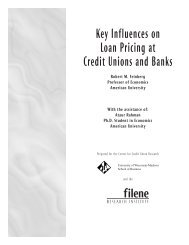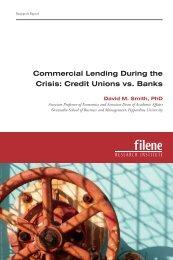Credit Union and Cooperative Patronage Refunds - Filene ...
Credit Union and Cooperative Patronage Refunds - Filene ...
Credit Union and Cooperative Patronage Refunds - Filene ...
Create successful ePaper yourself
Turn your PDF publications into a flip-book with our unique Google optimized e-Paper software.
A recent post to the <strong>Filene</strong> Research Institute’s website posed the<br />
question: Why do credit unions compare themselves to banks or<br />
even worry about return on assets? One could argue that cooperatives<br />
should not compare themselves with IOFs or that cooperatives could<br />
operate economically on a shoestring, out of a shoe box, inside a steel<br />
shed—a most utilitarian approach. It is also argued that cooperatives<br />
do not have to worry about financial comparisons so long as money<br />
flowing into the cooperative is just one penny more than money<br />
flowing out.<br />
For cooperatives—including credit unions—there are always at least<br />
three criticisms of this philosophical position. First, it is impractical<br />
to operate or manage any business organization of any size that<br />
close to the edge. Second, most<br />
members expect that their<br />
<strong>Cooperative</strong>s must generate enough earnings to compete with shares (<strong>and</strong> entitlement to undivided<br />
earnings; more on that<br />
IOFs by maintaining <strong>and</strong> growing the cooperative’s base of<br />
capital assets <strong>and</strong> its business. So even if the cooperative does later) will be safeguarded by the<br />
not raise capital in private capital markets, it is likely to have its board of directors <strong>and</strong> management.<br />
Members underst<strong>and</strong>ably<br />
own business objectives that must be financed with the cooperative’s<br />
earnings <strong>and</strong> equity.<br />
expect that the cushion will be<br />
more than a penny. The board<br />
must pay attention to earnings<br />
because members have legal recourse to sue the board if they suffer<br />
losses from a breach of the board’s fiduciary obligations.<br />
Third, some cooperatives are regulated by government agencies<br />
(NCUA for credit unions; FCA [Farm <strong>Credit</strong> Administration] for<br />
farm credit associations) <strong>and</strong> required to maintain minimum st<strong>and</strong>ards<br />
of financial strength. In addition, some cooperatives join<br />
together to raise capital from private markets. These cooperatives<br />
must maintain strong financial st<strong>and</strong>ards so that the notes <strong>and</strong><br />
bonds sold by their agents are attractive to investors in those markets.<br />
For example, the National Rural Utilities <strong>Cooperative</strong> Finance<br />
18








